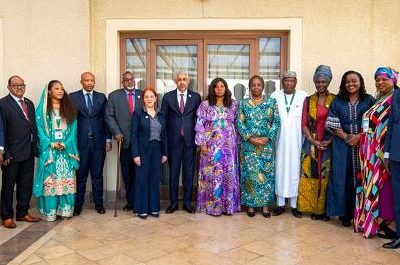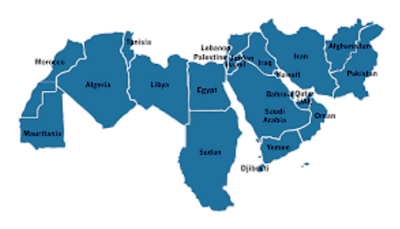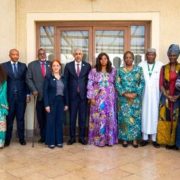By Zekeri Momoh
ABSTRACT
The collapse of the Soviet Union in the late 1980’s has made many Liberal scholars to conclude that Marxism is dead and plans should be made for it funeral. This study assessed the imperatives of the study and practice of Marxism in contemporary human society. It also, identified the challenges faced in the study and practice of Marxism. There are various reasons why the study of Marxism is importance in contemporary human society. One of such reasons is that Marxists postulation that capitalism have enrich few minority and impoverished majority of human being have remain undisputed by Liberal scholars. Secondly, Marxism as an approach is a product human experience in capitalist society. Thirdly, Marxism has provided social scientists a radical approach to the study of human society. However, despite, the volumes of works on Marxism, some Teachers of Marxism hitherto struggling to grasp the true picture and meaning of Marxism. Also, the failure of politicians/leaders to apply the core tenets of Marxism rather tenets of totalitarianism like intolerant to opposition has served as set back to the practice of Marxism. Lastly, Marxism has remained the official ideology of one-third of the entire human race and its influence on the ideological disposition of many poor people today has greatly increased.
INTRODUCTION
The relevance of Marxism as a theory has been questioned, especially with the end of Cold War. But with the emergence of contemporary international challenges, especially those related to the vagaries of capitalism and neo-liberalism, there has been renewed interest in the application of the Marxian theory in Social science discourse.
Marxism, as an ideology and a theory can be traced to the works and philosophy of Karl Marx about human society. In 1848, he drafted the famous “Communist Manifesto”, the master piece which he wrote at the age of 30. It is one of the outstanding, relevant and widely read works on socialism and it has been translated in several languages in the world. Karl Marx and his bosom friend as well as intellectual collaborator Fredrich Engels are regarded as the fathers of Marxism.
After the death of Karl Marx (1818-1883), Marxism as an ideology and theory have reached wider audience through the writings of his lifelong collaborators Fredrich Engels (1820-1895), a German Socialist Karl Kautsky (1854-1938) and Russian theoretician Georgi Plekhanov (1856-1918) who coined the concept of “dialectical materialism” (Heywood, 2007:55).
The year 2017 mark 150 years that the Volume 1 of Marx’s Capital was published in 1867. While, the famous Communist Manifesto published in 1848 by 2018 is 170 years. Over hundred and fifty years have passed both politicians and intellectuals have been studying the ideas of Karl Marx. This is because Karl Marx ideas contain truths about human society as it provides a proper diagnosis of the structure of human society (Mahajan, 2008:736).
In 1917, when some group of revolutionaries took over power in Russia and declared that they were putting Marxism in practice, the ideology and theory of Marxism became prominent in International politics. To some scholars, the introduction of Marxism in Soviet Union shows that revolution and progress in human society is almost impossible as predicted by Karl Marx. While other scholars envisaged the possibility of revolution as predicted by Karl Marx but considered it as a mere threat following the victory of Communist Party in China.
In the nineteenth century, Marxism becomes an academic theory with broader scope than socialism and spread vary fast in Europe and North America. By the twentieth century, almost everybody took Marxism serious both as a doctrine and a set of political practice. Today, Marxism has become the official ideology of one-third of the entire human race and its influence on the ideological disposition of many people today has greatly increased.
The inability of most countries in Latin America achieve economic development after the World War II led Scholars like Ander Gunder Frank to advanced a new variant of Marxism known as dependency theory, which would explain how Latin American countries continues to be underdeveloped even after they’ve gained their political independence. Erstwhile in Europe, Marxist thinkers sought to modify the theory of Marxism to help explain why “welfare capitalism” makes significant progress towards socialist revolution have drifted away than even imaged.
“Despite the collapse of the Soviet Union and Eastern Europe in the late 1980’s and the experimentation with capitalism from the early 1990’s till date, the poor across the world are beginning to clamour for a revival of socialism because of the severe hardship, inequality and worse state of living that capitalism have caused them.”
After the end of the cold war, following the collapse of the Soviet Union which was seen as a country that practice Marxism and China which later abandoned much of its communist rhetoric, Marxism became widely viewed as an ideology that is considered dead and people are calling for it obituary and should not be accorded relevance. Karl Marx prediction that capitalism will be dump in “the dustbin of history” was ironically applied to Marxism.
From the 1980s, the theory and practice of Marxism were considered important discourse in many universities and colleges at undergraduate and by extension post-graduate level such that many students ascribing the designation to themselves as “Marxist” both in Eastern Europe and Africa. Today the study of Marxism is most tertiary institutions are vanishing from most schools syllabi as Marxism is considered dead in many Universities across the country while in some Universities in Nigeria it is considered a neglected area of inquiry.
It is against this background that this study seeks to identify the challenges faced in the study and practice of Marxism. Secondly, is to justify why the study of Marxism is important when many liberal scholars have concluded that Marxism is dead.
CHALLENGES TO THE STUDY OF MARXISM
Volumes of literature have been written on Marxism, especially by its founding fathers (Karl Marx and Fredrich Engels) on the subject matter such as Poverty of Philosophy (1844), The Economic and Philosophic Manuscripts of 1844, Thesis on Feuerbach (1845), The German Ideology, The Communist Manifesto (1848), Class Struggle in France (1848-1850), The Eighteenth Brumaire of Loius Bonaparte (1852), The Critique of Political Economy (1859), Value, Price and Profit (1875), Das Kapita (1871), The Civil War in France (1871), The Gotha Programme (1875), Anti Duhring (1878), The Origin of the Family (1884), and Private Property and the state (1884) among others. This entire works by Karl Marx and Fredrich Engels are aimed at explaining different aspect of what Marxism is all about.
Despite, these volumes of works on Marxism, some Teachers of Marxism in some higher institutions in Nigeria are hitherto struggling to grasp the true picture of what Marxism entails and who is a Marxist in the true sense of it. Marxism as an approach to the study of human society has been faced with two interrelated challenges: on one hand from the intellectuals and the other from politicians and leaders.
Misconception of the meaning of Marxism by some Intellectuals
Marxism as an approach has not been properly taught in many Universities across the globe with special reference to Universities in Nigeria where it is taught as a course in the social science, thereby making students to lose total interest in the discourse or subject matter. In some institutions of higher learning in Africa it is called the “Theory and Practice of Marxism”. The inability of many Teachers of Marxism to explain in clear terms what the concept of Marxism entails and it application make mockery of the interesting discourse.
Also, what Marxism entails have not been properly understood by many intellectuals who hide under the nomenclature called “Marxist” or “Neo-Marxist” to teach the subject matter called “Marxism”. This explains why the study of Marxism especially in institutions of higher learning in Nigeria is on the decline and the study of Marxism not considered interesting. Moreover, the lack of interest in the study of Marxism has led to decline in the numbers of Teachers, teaching Marxism in most institutions of higher learning in Nigeria.
One of the most difficult aspects of the study of Marxism is that in contemporary literature on Marxism, there is slovenliness among Neo- Marxian scholars which have made the Marxian storehouse of knowledge a place of confusion. This is evident in Lenin’s attack of Kautsky, Stalins offensive against Trotsky, Khrushchev’s movement of de-Stalinisation, Mao’s rejection of Khruschchev, Djilas’s virulent invectives directed against Stalin, Sartre, Colletti’s criticism of Marcuse, dismissal of Althusser’s Marx be Della Volpe and so on (Johari, 2005:664). These criticisms have created significant confusion on modern literature on Marxism.
It is against this background that in this section we shall provide proper conception of what “Marxism” entails and who is a “Marxist” “Neo-Marxist” within the context of humanistic conception of Marxism.
Jha, (1975:35) provide us with a useful conception of Marxism in his response to the new leftists that:
“If a Marxist means that there can be no revolution without the working class, without the iron march of the proletarian battalions, they are not Marxists. If Marxism means changing to the conventional tenets of Marxian dogma, then they are not Marxists. If Marxist means acceptance of communism as a historical necessity, they cannot be considered as Marxists. If Marxism is regarded as a concept of institutional rather than intellectual contest they are not Marxists. If Marxism is identified with a specific world view whose contents is defined, surely they are not Marxists. If however, Marxism means a model rather than a theory, then they are Marxists. If standing on the side of the oppressed against the oppressors, on the side of wretched against the priviledged, on the side of the persecuted against the persecutors is Marxism, then they are Marxist. Above all, if radical orientation, secular view of the world, distruct of all closed doctrines and systems, striving for open-mindedness and vision of a new man and a new world free from hunger, diseases, pettiness and exploitation are signs of Marxism, then they are certainly Marxists” (Jha, 1975:35).
From the forgoing conception of Marxism, we can say that Marxism is a model and an ideology that stands on the side of or advanced the interest of the oppressed against the oppressors, oppressed against the oppressors, wretched against the privileged, persecuted against the persecutors. Marxism also entails a radical orientation about a secular view of the world, distrust of all closed doctrines and systems, striving for open-mindedness and vision of a new man and a new world free from hunger, diseases, pettiness and exploitation. Therefore, a Marxist is one who believes in all the core tenets of Marxism and practices it.
Over the years, various strands of Marxism have evolved but having common denominator which is the emancipation of human being from oppression and exploitation. Some of the variants of Marxism include: Class theory associated with Karl Marx and Friedrich Engels; Theory of revolutionary social change associated with Dahrendorf, Lockwood and C. Wright Mills; Conflict theory of revolutionary social change associated with Karl Marx and Engels; Theory of revolution associated with V.I. Lenin, Mao Zedong, Fidel Castrol, CheGuevera etc; Dependency theory associated with Andre Gunder Frank, Fernandro Cardoso, T. Dos Santops and others; Theories of imperialism associated with John Hobson, Joseph A. Schumpeter, Vladimir Lenin, Rosa Lumburg, Samir Amin, and Clause Ake (Biereenu-Nnabugwu, 2010:89); and Critical Theory associated with the Frankfurt theorists which blend Marxist political economy, Hegelian Philosophy and Freudian Psychology. Frankfurt theorists include Theodor Adorno, Max Horkheimer, Herbert Marcuse and Jurgen Habermas.
It also important to note that scholars who have sworn to adhere to the thinking of traditional Marxism have accused some Neo-Marxists scholars of “negative radicalism” (Fernbach, 1969:63) which is often use to show their subtle approach in the movement relations to the social milieu that basically settles and adjust itself to the existing status quo and its institutional rules and procedures as a framework that will bring about the desired reforms, through negotiation with the existing order and eventually loses its revolutionary ability and thus create a wide gap between theory and practice of Marxism (Therborn, 1970:94).
Similarly, traditional Marxists have also accused some Neo-Marxists of abandoning the outstanding fact that it is the capitalist system that ensures that the oppressors and the oppressed or the exploiter and the exploited make mockery of the human race by refusing to disconnect itself from the existing institutions that entrenched monopoly of capitalist power which they “unconsciously act” as a “safety valve” and as “the whipping boys of capitalism” (Johari, 2005:659).
Now, that the true meaning of Marxism and who a Marxist is understood. We can provide answers to three fundamental questions that are central to this work. What are the imperatives of studying Marxism? What is Marxism? Who is a Marxist or Neo-Marxist?. At this juncture we should be able to provide answers to these questions. Let us now consider the next challenges hindering the study and practice of Marxism.
Improper application of the Tenets of Marxism by Politicians/Leaders
Biereenu-Nnabugwu, (20010:89), posit that Marxist political theories have on underpinning code they emphasize the fact that economic factors determines the form of politics, culture, law etc. of any society. In doing this he added, that the mainstream Marxist theories rely on the concept of dialectical materialism and historical materialism, that thesis and antithesis produce a synthesis and on materialist interpretation of history. He also emphasizes that factor of surplus value and underlines the critical role of class in the affairs of any given society.
One of the reasons why Marxism failed in many countries of Eastern Europe and the Soviet Union in the early twentieth century was the inability of the leaders who adopt the Marxian ideology to accurately apply the core tenets of Marxism without perverting it with totalitarianism and state led-repression. For instance, in 1917, when some group of revolutionaries took over power in Russia and declared that they were putting Marxism to practice, the theory of Marxism became famous. Though, some scholars thought that the emergence of Marxism in the Soviet Union indicate that progress and revolution have become an inescapable feature in human society, as Karl Marx had earlier predicted.
“In Africa and Eastern Europe where Marxism was considered dead political parties with communist and socialist ideology are becoming appealing to the people pointing to the fact that there is a call for the reawakening of Marxism in societies where it was considered dead.”
But when countries from Eastern Europe and the Soviet Union fails to exhibit the characteristics of communist system envisaged by Karl Marx brought suspicion as leaders from both the Eastern Europe and the Soviet Union perceived that leaders from Eastern Europe and the Soviet Union were using various strategies to ensure their survival in power. Rather, what we saw as the characteristics of the Marxist ideology adopted by the countries were the attributes of totalitarianism and violent state led-repression, which made some scholars to conclude that the Marxist ideas practiced in the Soviet Union and Eastern European countries were perverted or digressed from the true doctrine of Marxism, which we wholly accepted in this work. For instance, both in Hungary and Yugoslavia in the 1960s and 1970s an attempt by masses to protest against the repressive nature of the totalitarian structure put in place by their respective government were violently crushed with the Soviet Union Armour tanks. This led to the eventual collapse of the socialist regime in those countries were Marxism was experimented.
By and large, Marxism has hitherto remains an elegant ideology, approach as well as a theory that gives us better understanding of human society in its entirety as it formulation was anchored from practical human experience in a capitalist society. But one of its major setbacks is it application by policy makers. However, in the next section of this work, we shall see how the present application of the ideas of Marxism is yielding positive results in Latin American countries like Argentina.
IMPERATIVES OF MARXISM AS A TOOL FOR SOCIAL SCIENCE ANALYSIS
In 1917, Lenin observed: “There are decades when nothing happens, and there are weeks when decades happen.” Almost a century later, the Soviet communist leader’s words are as fresh as ever.
In this section, our effort is to debunk in its entire ramification that Marxism as an ideology, approach and theory is dead and there is call for it funeral. Marxism is still alive and will continue to be relevant as long as human society exist. First, Marxism as an ideology, approach and theory is product of human experience in capitalist society in Europe, rather it foundational bases was experimental and practical after a rigorous investigation into the nature and causes of inequality that led to the division of human society into classes. As we have argued earlier, Marxism had it root from practice life experience will not die as experience from human history shows that ideas don’t die so it cannot be easily bury, so calling for the funeral of Marxism will amount to venturing into an impossible venture.
It is pertinent to state it clearly at this point that the collapse of the Socialism in Russia and Eastern Europe does not mean the end of Marxism as an ideology. In fact, Heywood, (2007) argues that:
“collapse of communism at the end of the twentieth century need not betoken, it may give Marxism as a political ideology; indeed, it may give Marxism, now divorced from the vestiges of Leninism and Stalinism a fresh lease of life” (Heywood, 2007:55).
Before the end of the cold war Marxism had proven to be one of the most productive and effective ideology in Soviet Union and Eastern European countries. It collapse became eminent as leaders like Josef Stalin and to some extent Nikita Kruhschev deviated from the expected tenets of Marxism and abandoned the humanistic ideas that propelled Marxism from the onset by its founding fathers Karl Marx and Fredrick Engels by replacing socialist democracy also known as proletarian democracy in some literature with features that negates the tenets of Marxism like intolerant to oppositions, seat-tight leadership, control of party structure, among other features of totalitarianism in order to ensure their survival in power.
“Traditional Marxists have also accused some Neo-Marxists of abandoning the outstanding fact that it is the capitalist system that ensures that the oppressors and the oppressed or the exploiter and the exploited make mockery of the human race”
Beginning from 1998, the paradigm shift in Latin American countries has shown the re-emergence of socialism. The tide towards socialism began to gain momentum in Venezuela under the leadership of Hugo Chevez when he adopted a policy which he called “Bolivarian Revolution” named after the nineteenth century ant-colonial leader Simon Bolivar. President Hugo Chevez adopted the practice and adopted the socialist ideology in Venezuela in which he rejected Venezuela former Presidents policy of “fetishist free-market discourse” in favour of what he called the “twenty-first-century socialism”. President Hugo Chevez ensures that the state has total control over its oil industry on the bases that he sees the state oil as the wealth of all Venezuelans and should be used for the benefit of all. In addition, President Hugo Chevez instituted a programme that will ensure that there is provision of subsidized food and medical care in the poorest areas of the very poor in Venezuela.
In Bolivia, President Evo Morales followed similar pattern of reversing to socialism as President Hugo Chevez of Venezuela did by nationalizing it oil and gas industry. In Ecuador, President Rafael Correa have been advocating for President Hugo Chevez “twenty-first-century socialism”. As at January 2006, the Argentina government has been able to pay her foreign debt of $93billion to the IMF as it adopted the “twenty-first-century socialism”. All the examples cited above shows clearly the imperative of the Marxism in contemporary time. It has also provided the basis for scholars and policy makers to challenge the current international economic order and envisage that there is genuine alternative framework to the present international liberal economic consensus that put poor countries in a disadvantage position.
Besides, the study of Marxism is important today and should be studied because one of its arguments is that capitalism enriches few minorities at the detriment of the large majority of human beings in any capitalist society have remained undisputed by Liberal scholars till date. Rather what we have witness globally have been alarming rate of marginalization, pauperization and alienation of large numbers of people. This explains why Marxism remains the official philosophy of one-third of human race and the influence of Marxism is on the increase on a daily basis (Mahajan, 2008:736).
As pointed out by Biereenu-Nnabugwu (2003:64) Marxist political theories are not only theories for understanding and explaining the world but also offer analytical tool or framework for changing the system fundamentally. Similarly, Mahajan, (2008) rightly observe that in order to have a complete picture of contemporary society, a study of Marxism is important as it is playing a significant role in the lives of millions of peoples across the globe.

Communist China and the embrace of capitalism
Marxism provides a radical approach to social scientists in explaining social and political phenomena as well as study human society which help in solving contemporary political, social and economic challenges facing human society that are inherent in capitalism and have generated massive inequality and poverty. Thus, Marxism as an ideology is appealing to millions of people across the globe because many people are living unsatisfactory lives. Large population of people across the globe is suffering from one form of what we called “Political economy of disabilities”. In Africa, the gap between the “haves” and the “have-not” have drastically increased leaving majority of the people in abject poverty while a tiny minority are living in affluence leaving most African societies facing the contradictions inherent in capitalism.
Despite the collapse of the Soviet Union and Eastern Europe in the late 1980’s and the experimentation with capitalism from the early 1990’s till date, the poor across the world are beginning to clamour for a revival of socialism because of the severe hardship, inequality and worse state of living that capitalism have caused them. Elsewhere, in Mumbai, India during the 4th World Social Forum socialist banners with its slogan boldly written were held high over the venue calling for the revival of socialism due to the economic inequalities and poverty suffered by the people. Interestingly too, in Africa and Eastern Europe where Marxism was considered dead political parties with communist and socialist ideology are becoming appealing to the people pointing to the fact that there is a call for the reawakening of Marxism in societies where it was considered dead. This means that Marxism is still in the mind of the people and it lives on. Also, Marxism as an ideology is creating a lasting impression in the mind of millions of poor people all over the world that there is hope for them out of their present state of exploitation.
Again, Mahajan (2008) argues that:
“Marxism is basically a politics of hunger and no wonder it appeals to the poor and down-trodden. The ideological message of Marxism is in these terms:… You are poor, not because of anything you have done or anything you have failed to do, not because of original sin or the will of God or because of bad luck. You are poor because of the economic and political conditions. These conditions are called capitalism… You do not have to be poor. The conditions that make you poor can be changed. They are going to be changed…Those who rule over you and keep you poor will be overthrown. This is the next step forward in human progress. You are going to take that step. By revolution you can eliminate once and for all the exploitation of man by man; you can enter into socialistic society in which mankind conquers nature. And no man any longer wil (sic) will know poverty and exploitation. ” (Mahajan 2008:736-737).
In addition, we are not disputing the fact that the orthodox Marxism does not have it limitations especially on it predictive capacity. Even if Marxism has its limitations, it has to be studied. However, Neo-Marxists have been able to modify the Marxist theory to help clarify why, in conditions of “welfare capitalism”, progress towards socialist revolution seemed further away than ever. Many ideas of Marxism have been appreciated into the main stream of political and social thought. Besides, one of the central arguments of Marxism is that the growth of wealth can also lead to inequality, has become a major focus of study in economic research today. Today theoretical descendents of Marxism remain alive and well as Marxist thinking in Latin American and Africa in recent years have shown Marx’s ideas have not disappear from the mind of policy makers
Finally, the Marxian framework for analysis remain one of the most popular approaches to the study of human society and the process of socio-political and economic changes in many Universities in Africa. Besides, the Marxian framework of analysis have been used and considered useful for explaining the role of class and social changes in human society. Scholar like Karl Marx, Fredrick Engels, Vladimir Lenin, Mao Zedong, Antonio Gramsci, Ralp Miliband, Nichos Polantza, Fidel Castro, Kim II Sung, Leon Trotsky, Kweme Nkrumah, Julius Nyerere, Andre Gunder Frank, Samir Amin, Herbert Marcuse, Eduard Bernstein, Leszek Kolakowski, S. Stojanovic, Mengistu Haile, Jean – Paul Sarre, J. Garaudy, Theodre Adorno, and Ernest Bloch. In recent times, scholars like Claude Ake, Okwudiba Nnoli, Edwin Madunagu, Bala Usman, Julius Ihonvbere, A.M. Babu, Attahiru Jega, Abubakar Momoh, Samuel Gabriel Egwu, Dung Pam Sha, Hassan. A. Saliu, and Victor A.O Adetula has at one point or the other employed the Marxian framework of analysis in their studies.
CONCLUSION
From the above analysis, we have argued that bulk of the problem responsible for the study and practice of Marxism lies with the misconception of what Marxism entail by most scholars especially its humanistic ideas. Besides, in terms of practicability it has generated the desired result over the years especially in some countries though, the inability of adherents to the tenets of Marxism abiding by the tenets of Marxism have affected it practice in many countries of the world. Moreover, we realized that the failure of Marxism in the late 1980’s was not because Marxism as an approach and ideology was faulty but leaders who claimed to be practitioners of Marxism deviated and abandon the core tenets of Marxism in order to enhance their survival in power by entrenching intolerance to opposition and mixing the elements of totalitarianism with Marxism which eventually lead to its own downfall.
Lastly, we have argued that Marxism is a product of human experience from capitalist society in Europe. We equally argued that Marxism is important because it has provided social scientists a radical approach to the study of human society. Also, that Marxism postulation that capitalism enriches tiny minority at the detriment of the large majority have remain undisputed by liberal scholars.
REFERENCES
Biereenu-Nnabugwu, M. (2003). Political Theory. An Introduction Framework Enugu: Quintagon Publisher.
Bierenu-Nnabugwu, M. (2010). Methodology of Political Inquiry: Issues and Techniques of Research Methods in Political Science, Enugu; Quintagon Publisher
Fernbach, E. (1969). New left Review No. 56, July-August P: 63
Heywood, A. (2007). Politics; Third edition New York: Palgrave Macmillan
Jha, B.K. (1976). Un-marxian development of Marxism Indian Journal of Political Science Volume XXXVII No.4 P: 35
Johari, J.C. (2005). Contemporary political theory: New diamensions, basic concepts and major trends. Second Revised and enlarged edition New Delhi: Sterling publishers private limited
Therborn, G. (1970). “The Frankfurt school” New left Review London No.60 March- April P: 94

Zekeri Momoh, a member of the Baobab Think Tank, is a director at Global Network for Advancement of Integrity Transparency and Accountability (GNAITA) Abuja-Nigeria. Email: [email protected]




















